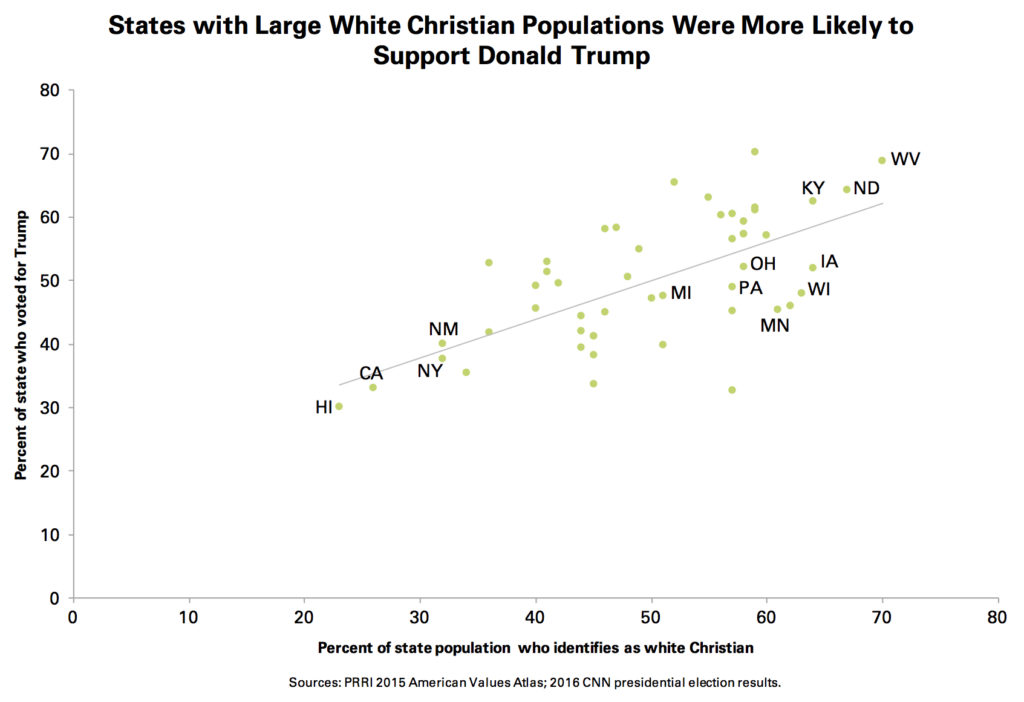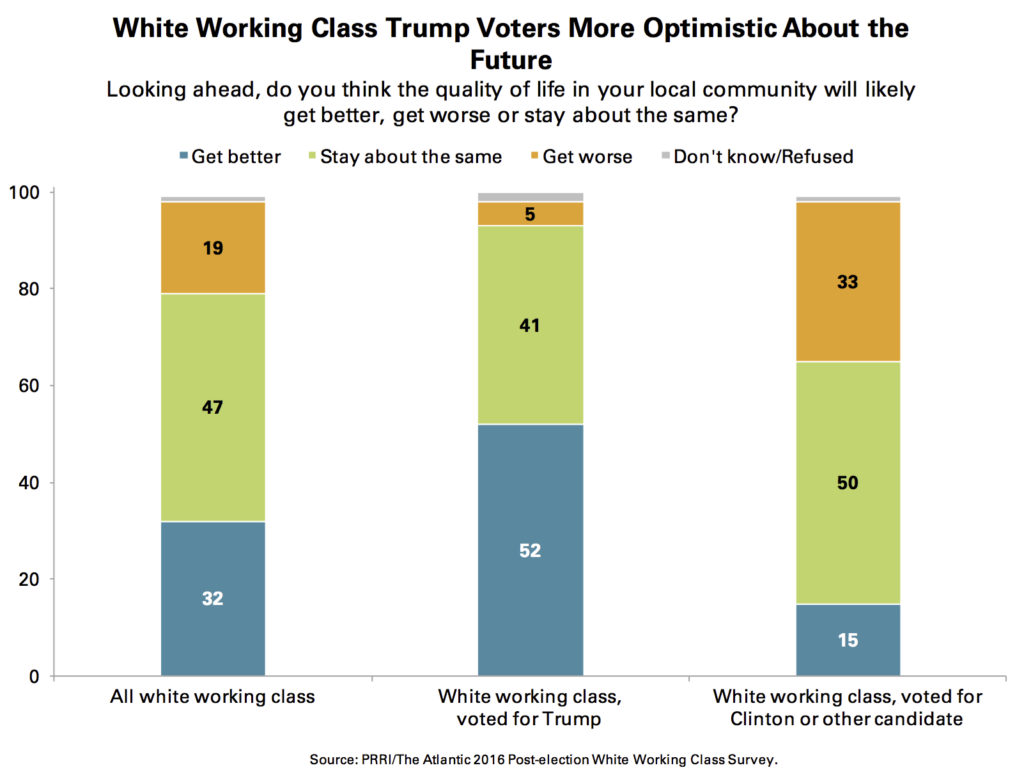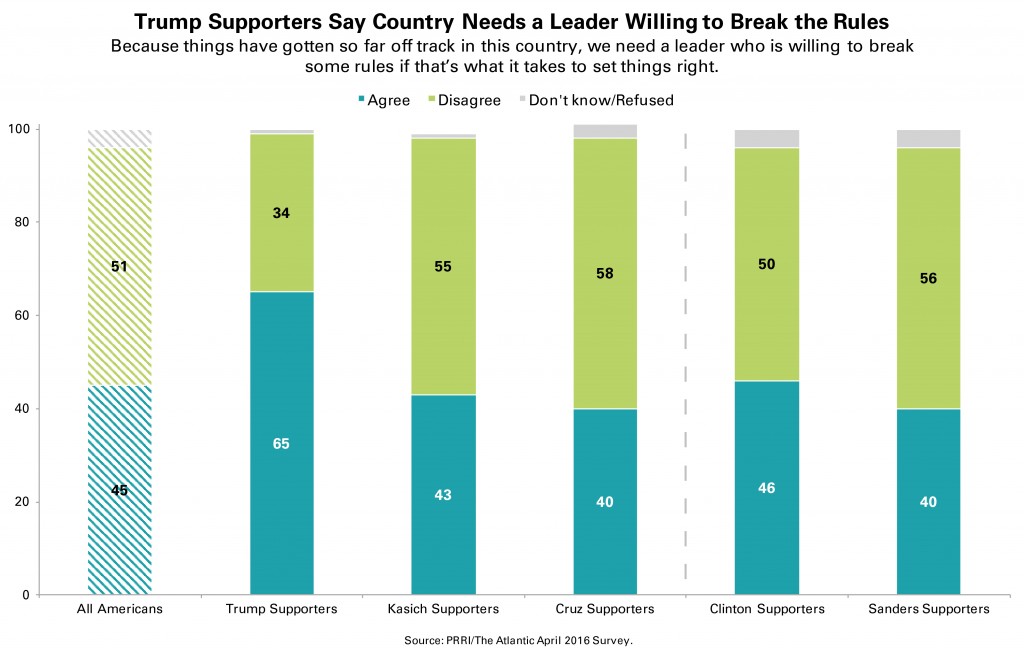After a year marked by an unprecedented election cycle, a rise in anti-immigrant and anti-Muslim rhetoric, and the rallying of America’s white evangelical Protestants behind President-elect Donald Trump, we looked back at some of the most important PRRI findings that will shape political and civil discourse in 2017.
1. Despite hardline proposals from Trump and other Republican leaders, most rank-and-file Republicans support some legal recognition for immigrants currently living in the U.S. illegally. Less than one-third (29 percent) of Republicans favor identifying and deporting them. More than seven in ten Republicans favor a path to citizenship for illegal immigrants provided they meet certain requirements (49 percent) or allowing them to become permanent legal residents (22 percent). 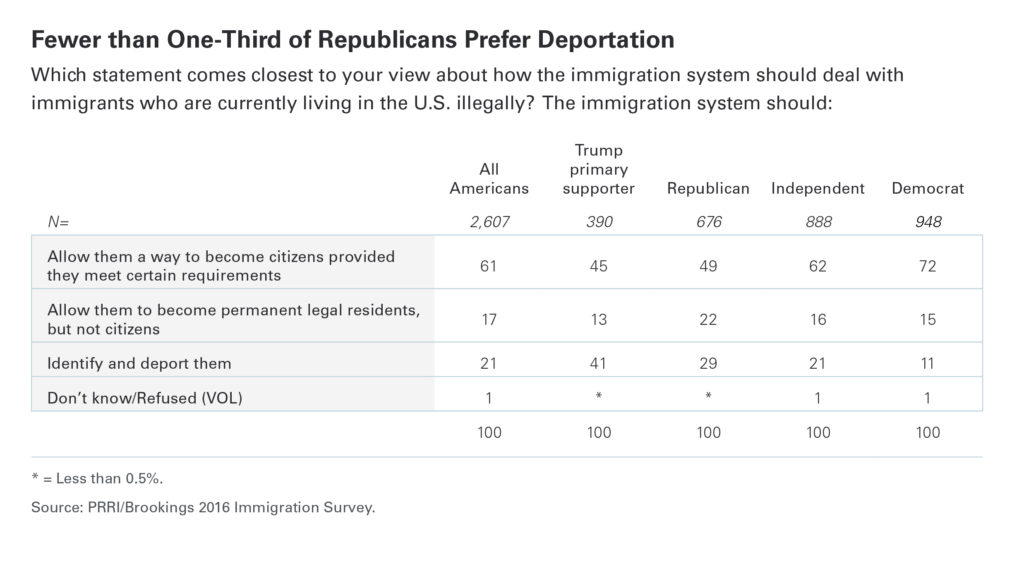 2. Most Americans oppose Trump’s protectionist policy proposals. Ahead of the presidential election, a PRRI/Brookings Institution survey found that solid majorities of Americans oppose building a wall on the U.S. border with Mexico (58 percent), instituting a temporary ban on Muslims entering the U.S. (58 percent), and passing a law that would deny Syrian refugees entrance to the U.S. (55 percent).
2. Most Americans oppose Trump’s protectionist policy proposals. Ahead of the presidential election, a PRRI/Brookings Institution survey found that solid majorities of Americans oppose building a wall on the U.S. border with Mexico (58 percent), instituting a temporary ban on Muslims entering the U.S. (58 percent), and passing a law that would deny Syrian refugees entrance to the U.S. (55 percent).
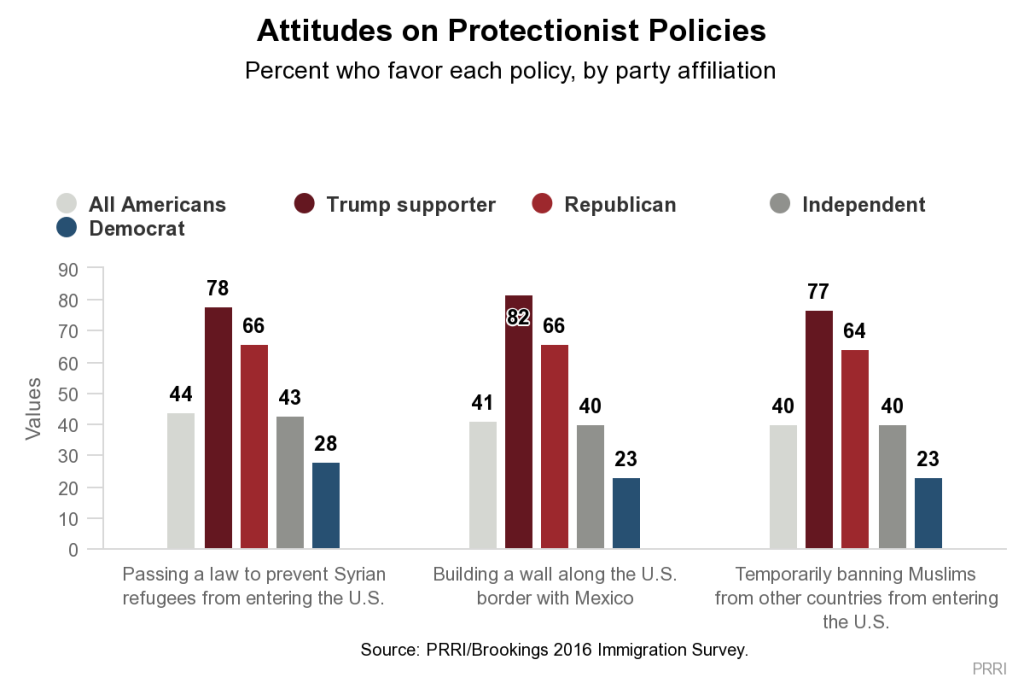 3. Americans are skeptical about Islam’s compatibility with American values. The same survey also found that a strong majority (57 percent) of Americans say the values of Islam are “at odds” with American values and way of life, including nearly eight in ten (79 percent) Republicans and more than four in ten (42 percent) Democrats.
3. Americans are skeptical about Islam’s compatibility with American values. The same survey also found that a strong majority (57 percent) of Americans say the values of Islam are “at odds” with American values and way of life, including nearly eight in ten (79 percent) Republicans and more than four in ten (42 percent) Democrats.
4. Republicans are split over so-called “bathroom bills.” An August PRRI survey found that Republicans are evenly divided over laws requiring transgender individuals to use bathrooms that correspond to their sex at birth rather than their gender identity (44 percent favor, 44 percent oppose). A majority (53 percent) of Americans overall oppose such measures.
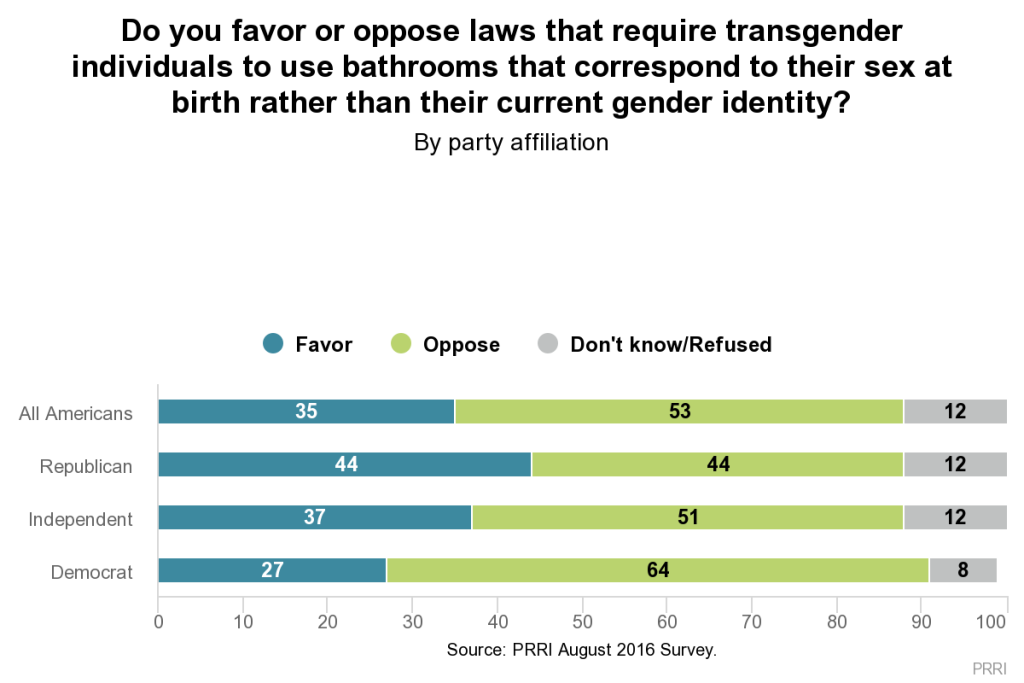 5. White evangelical Protestants grow more accepting of politicians’ moral indiscretions. A PRRI/The Atlantic survey taken after the release of footage capturing Trump making lewd remarks about women found that more than seven in ten (72 percent) white evangelical Protestants now say an elected official who commits an immoral act in their personal life can still behave ethically in their professional life, a stunning 42-point jump in their opinion on this issue since 2011.
5. White evangelical Protestants grow more accepting of politicians’ moral indiscretions. A PRRI/The Atlantic survey taken after the release of footage capturing Trump making lewd remarks about women found that more than seven in ten (72 percent) white evangelical Protestants now say an elected official who commits an immoral act in their personal life can still behave ethically in their professional life, a stunning 42-point jump in their opinion on this issue since 2011.
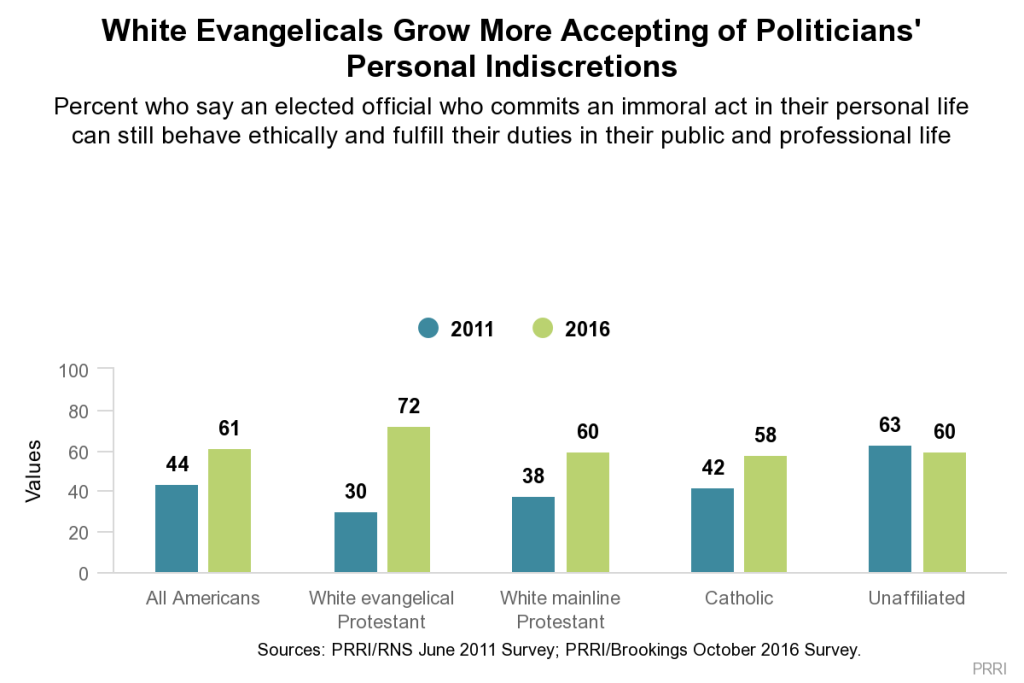 6. Trump supporters are likelier to be nostalgic for the 1950s. While the public overall is closely divided over whether the American way of life has mostly changed for the better or for the worse since the 1950s (51 percent vs. 48 percent, respectively), Trump and Clinton supporters are polar opposites on the issue. Over seven in ten (72 percent) Trump supporters say American culture and way of life has mostly changed for the worse, while a similar number (70 percent) of Clinton supporters say it has mostly changed for the better.
6. Trump supporters are likelier to be nostalgic for the 1950s. While the public overall is closely divided over whether the American way of life has mostly changed for the better or for the worse since the 1950s (51 percent vs. 48 percent, respectively), Trump and Clinton supporters are polar opposites on the issue. Over seven in ten (72 percent) Trump supporters say American culture and way of life has mostly changed for the worse, while a similar number (70 percent) of Clinton supporters say it has mostly changed for the better.
7. Even after Trump’s victory, white working-class Americans are not optimistic about the future. In a poll taken just after the election, about two-thirds of white working-class Americans said the quality of life in their local community will likely stay the same (47 percent) or get worse (19 percent). Only about one-third (32 percent) say life is likely to get better.
8. Heading into the presidential election, many Americans—particularly Trump supporters—thought we needed a leader willing to break the rules. A PRRI/The Atlantic survey taken during the primary season found that close to half (45 percent) of Americans and nearly two-thirds (65 percent) of Trump primary voters agreed that because things have gotten so far off track in this country, we need a leader willing to break some rules if that’s what it takes to set things right.
9. The religiously unaffiliated now constitute the largest “religious” group in the U.S., accounting for 25 percent of Americans. In an analysis released alongside his book, The End of White Christian America, PRRI’s Robert P. Jones noted that while the ranks of the religiously unaffiliated are booming, the proportion of Americans who are white Christians is now only 43 percent. As a result, white Christians are aging, while Muslims, Buddhists, Hindus, and the religiously unaffiliated have the lowest median ages.
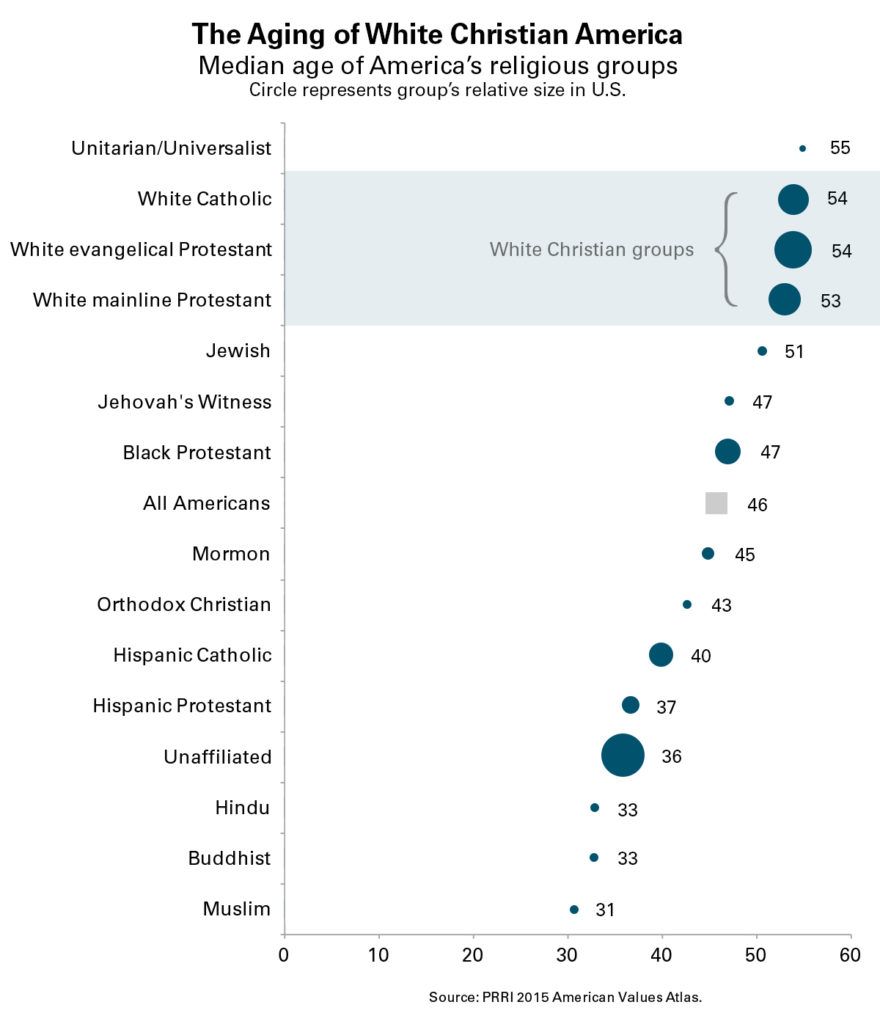 10. States with large white Christian populations were likelier to support Trump. In a telling post-election analysis, PRRI’s Dan Cox and Robert P. Jones found a high correlation between the percentage of white Christians and support for Trump in key battleground states. The Republican nominee received 69 percent of the vote in West Virginia, where white Christians make up 70 percent of the state’s population. Four states where Trump performed better than expected also had large concentrations of white Christians, including Iowa (64 percent), Wisconsin (63 percent), Ohio (53 percent), and Pennsylvania (57 percent).
10. States with large white Christian populations were likelier to support Trump. In a telling post-election analysis, PRRI’s Dan Cox and Robert P. Jones found a high correlation between the percentage of white Christians and support for Trump in key battleground states. The Republican nominee received 69 percent of the vote in West Virginia, where white Christians make up 70 percent of the state’s population. Four states where Trump performed better than expected also had large concentrations of white Christians, including Iowa (64 percent), Wisconsin (63 percent), Ohio (53 percent), and Pennsylvania (57 percent). 